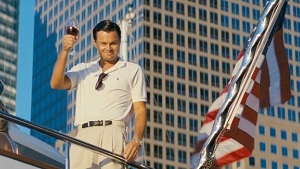 After sitting through three hours of unrelenting, unrepentant debauchery, your first query regarding The Wolf of Wall Street might be one of genesis. How in the blue hell did this thing get made? Yes, yes, there’s a realistic and tangible answer to that burning question, and it’s only five words long: Leonardo DiCaprio and Martin Scorsese. (Credit should go to Red Granite Pictures, too.) But none of that makes for satisfactory explanation as to how a mainstream Hollywood movie could be this explicit, this over the line, and this unapologetic all at the same time; most shamefully of all, it’s also a total blast, though you’ll probably want to take a shower afterward.
After sitting through three hours of unrelenting, unrepentant debauchery, your first query regarding The Wolf of Wall Street might be one of genesis. How in the blue hell did this thing get made? Yes, yes, there’s a realistic and tangible answer to that burning question, and it’s only five words long: Leonardo DiCaprio and Martin Scorsese. (Credit should go to Red Granite Pictures, too.) But none of that makes for satisfactory explanation as to how a mainstream Hollywood movie could be this explicit, this over the line, and this unapologetic all at the same time; most shamefully of all, it’s also a total blast, though you’ll probably want to take a shower afterward.
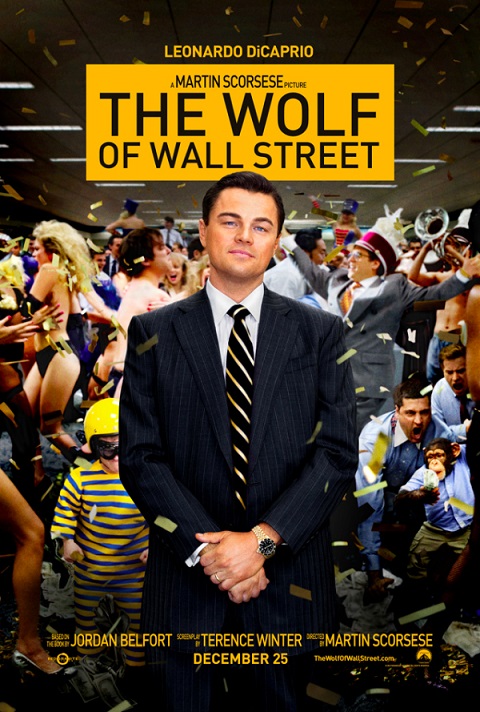 Scorsese’s profane epic falls in line with the works of Allen, Korine, Bay, Coppola, and a handful of other directors who have committed to celluloid their own personal portraits of American greed in 2013; as the title implies, his movie portrays rampant malfeasance and flagrant disdain for the law within the metonym for America’s financial market. (Funny how often American cinema manages to circle back around to Wall Street over decades and eras; it’s not a mistake that Wolf makes reference to Oliver Stone’s 1987 scathing indictment of stock market avarice.) Like several of his peers, he’s also calling on reality to supply the blueprint for his narrative; enter one Jordan Belfort, the man whose memoirs provide the basis for Scorsese’s film.
Scorsese’s profane epic falls in line with the works of Allen, Korine, Bay, Coppola, and a handful of other directors who have committed to celluloid their own personal portraits of American greed in 2013; as the title implies, his movie portrays rampant malfeasance and flagrant disdain for the law within the metonym for America’s financial market. (Funny how often American cinema manages to circle back around to Wall Street over decades and eras; it’s not a mistake that Wolf makes reference to Oliver Stone’s 1987 scathing indictment of stock market avarice.) Like several of his peers, he’s also calling on reality to supply the blueprint for his narrative; enter one Jordan Belfort, the man whose memoirs provide the basis for Scorsese’s film.
Among the year’s array of scoundrels, thieves, and con artists, Jordan Belfort stands out as the most prolific of the bunch simply for the heights of his extravagance and the depths of his misdeeds. Some people steal shoes from spoiled, naive celebrities; some craft exquisite Ponzi schemes. Belfort stages drug-fueled, alcohol-soaked orgies while holding court in his firm, infamous penny stock boiler room Stratton Oakmont. Later, he sinks a goddamn yacht. (Okay, that’s not fair to Belfort: Mother Nature, one of the two ladies in the film our hero fails to bring to heel, sinks the yacht. Belfort’s just fool enough to try sailing in unfavorable conditions.)
The point is that Belfort’s brand of indulgence beats everyone else’s, and this is just a scuff on the surface of the film’s gluttony. Need I stress that massive, hundred and seventy nine minute running time? Scorsese thoroughly stuffs The Wolf of Wall Street to the gills, infusing it with a dollop of vim and the impeccable execution expected of a master filmmaker, so as to affect exhaustion in his audience; this is a party you’ll probably be all too happy to leave behind you, not for matters of quality but for matters of taste. In short, the film is totally bereft of it, but of course that’s entirely by Scorsese’s design. The Wolf of Wall Street ain’t for the faint of heart.
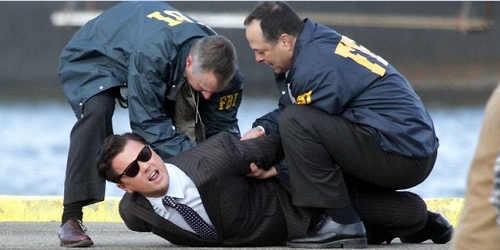
Yet that only speaks to the depths of Belfort’s transgressions as a master of the universe. If the name means nothing to you, then a quick history lesson should suffice: in the 90s, he, along with his aide de camp, Donnie Azoff (Jonah Hill), defrauded investors for millions upon millions of dollars before meeting his justice at the hands of the FBI in 1998. Scorsese aims to cover the man’s rise and fall in full, as detailed in Belfort’s book; there’s a chance, however, that Marty made a few embellishments along the way, putting on a nearly never-ending series of frat house bacchanals that each upstage their predecessors through ratcheting levels of lasciviousness. Buying his vision of Belfort’s unapologetic degeneracy wholesale, in other words, might prove problematic if you’re a stickler for reality.
But that’s the film’s driving purpose: to showcase excess for excess’ sake, in the wildest, most over the line way possible. The Wolf of Wall Street holds nothing back, going to enormous lengths to shock an audience that’s not accustomed to seeing DiCaprio do, well, all the libidinal things that Scorsese has him do here. We’ve seen Leo transition from teen heartthrob to bona fide actor (and occasional tough guy) over the years, but Wolf has him operating on a new level; it represents his next evolution as a performer and continues Marty’s track record as an envelope pusher. There’s no way to succinctly document how badly these two men behave here; suffice to say that they’ll probably take you by surprise and maybe even make your cheeks turn crimson. Such is the power of Belfort’s American dream.

Undercutting all of the celebrations here, though, is deep-rooted anger. Scorsese doesn’t moralize in same the way as , say, Pain & Gain or Blue Jasmine, to the effect that an initial read on Wolf may leave the impression that he’s making a tacit endorsement of Belfort’s lifestyle. It’s not until the movie’s last hour or so that events begin working against our twisted protagonist’s best interests, and even then we’re not talking about the same kind of cosmic comeuppance that his cinematic contemporaries have earned throughout the year. Greed really is good, Scorsese tells us; you have more fun, more privilege, and higher quality of life. You also get to defraud people and piss on regulations without having to suffer due consequence. That’s the American dream, baby!
G-S-T Ruling:
Oh, to lead an existence where it’s just as easy to exult the virtues of our land of opportunity as it is to flip the bird at authority when you willfully break the rules. In playing out the blatant hypocrisy of Belfort and his cohorts, The Wolf of Wall Street expends the bulk of its roiling outrage; money doesn’t make you a better person, but the people who jealously hoard it work tirelessly around the clock to convince themselves otherwise. Scorsese’s film might be the sharpest condemnation of wealth culture in 2013, barely analytical in its approach and far more contented to engage Belfort’s hedonism directly so as to reveal the corruption at its center.
It’s a work of immensity; massive in scope and scale, overflowing with its ensemble cast (which includes but isn’t limited to Jon Bernthal, Rob Reiner, Jon Favreau, Cristin Milioti, Kyle Chandler, Matthew McConaughey, Jean Dujardin, Margot Robbie, and many, many others), towering in sheer achievement. Contemporary movies like this just don’t get greenlit, but then, most people aren’t Marty, who even as a septuagenarian possesses the fire and passion of a far younger man. We should be grateful that he still had The Wolf of Wall Street in him. Whether you can stomach his message is a whole other story, but maybe we should also be thankful that a modern mainstream film can be this shocking all the same.
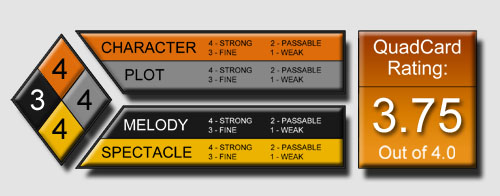
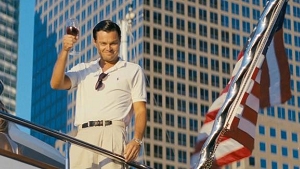

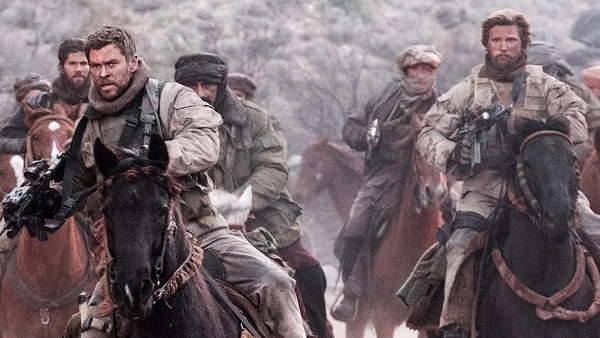
4 Comments
Nick Powell
Great review, Andrew. You touch upon so many aspects of why I loved the film, while pointing out some things I never noticed (Mother Nature being the 2nd woman he can’t control). I also like how you discuss Leo’s evolution even further, something that many, including myself, did not think he could push any further after last year’s Django. Out of curiosity, how much did you love Jonah Hill in the role?
Andrew Crump
Thanks Nick – I definitely tried to hit every note that felt important to me. But the film is so huge that it’s hard to keep to word counts without leaving something out. To that end, I thought Hill was fantastic, and he definitely got a vote from me for this year’s critics’ groups ballot shenanigans.
I have much and more to say on the film still, which is saying something. It’s maybe a top ten contender for Scorsese, which is also saying something.
Colin Biggs
Easily one of the best viewing experiences I have had in a while. I have never seen so many critics so animated at a screening.
Andrew Crump
I could scarcely sit still myself, and I mean that only in the best way possible. The ‘ludes/car sequence killed me. That Marty follows that up with the coke/Popeye sequence, well, I couldn’t breathe. Just spectacular stuff.